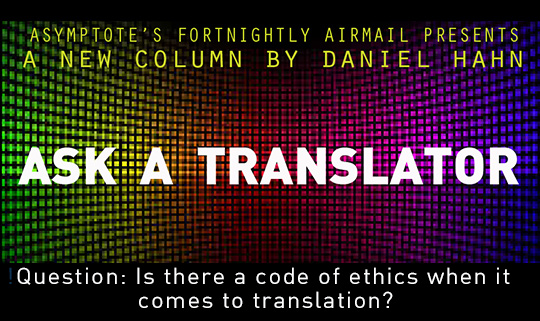Our literary translator on the street, award-winning writer and editor Daniel Hahn, is back with another installment of “Ask a Translator,” the monthly column responding to readers’ deepest questions about the day-to-day practice of literary translation. This time around, Asymptote reader Mandy Doll from Singapore asked the following:
Is there a code of ethics when it comes to translation?
This is how the world looks today, according to the evening news:
• Militant groups kill dozens in Brussels bombings!
• Britain’s campaign to split from the E.U. heats up!
• Trump and G.O.P. rivals escalate anti-immigrant rhetoric!
These are stories of division.
They are stories of a failure of empathy, a failure of imagination. Stories of willful misunderstanding. Stories that tell us how the powerful capitalise on failed media and failed education systems to persuade the powerless that the only thing that really matters is how people are different, not how they are the same.
Every assumption that underpins the translator’s work is in opposition to this. Translation is optimistic. Translation is generous. Translation assumes that—however unlikely—mutual understanding is possible. Translation says, Listen—see that guy over there? Give him a chance, ’cause what he’s saying is worth hearing. Translation assumes that my story can mean something to you, that her concerns way over there are not fundamentally different to his worries over here. Come to that, doesn’t all literature make that assumption? READ MORE…

